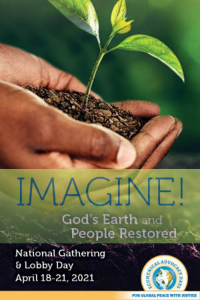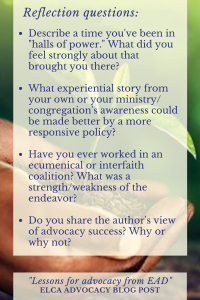The ELCA is a founding organization and sponsor of Ecumenical Advocacy Days, attended annually by many Lutherans for skill building and experience. A leader from an ELCA-affiliated state public policy office highlights central learnings for him about effective and meaningful faith-centered advocacy.
By guest blogger the Rev. Paul Benz, co-director of Faith Action Network in Seattle, WA
 I want to share some of my thoughts about the annual Ecumenical Advocacy Days (EAD) gathering. I’ve been attending these even before EAD came into being! The primary reason I attend is because of our calling as Christians to use our voice for justice – to create the change so many of us desire – to use our voice for love of neighbor.
I want to share some of my thoughts about the annual Ecumenical Advocacy Days (EAD) gathering. I’ve been attending these even before EAD came into being! The primary reason I attend is because of our calling as Christians to use our voice for justice – to create the change so many of us desire – to use our voice for love of neighbor.
Another reason for the importance of these gatherings of people from all Christian denominations and from all parts of our country is presence and place. We can be present in the halls of power where decisions are made that impact people’s lives and how we live together, and when present there, our voices are part of decisions that impact our planet – mother Earth.
My experience this year when EAD met April 18-21 was very special because it was the day before Earth Day (and our state delegation actually had two virtual, EAD-organized Capitol Hill visits on Earth Day). Again this year I was reminded that as important as each of our voices are and our presence is, to be effective in influencing elected officials our voices and presence need to convey stories about and from our neighbors who are the most impacted by policy. This year we called on Congress to act on climate justice by addressing the intersection of climate change, economic justice, gender justice and racial equity.
My experience this year was also a reminder that regular usage makes our voice and presence most effective. Our decision makers are most responsive to those they hear from and see recurrently. Going to EAD to meet with our members of Congress and their staff is very important, but if there is no follow up little will change. Remember the persistence of the widow in the gospel of Luke.* The more we use our voice and more present we are, the greater our impact will be.
Another important part of the EAD experience is with whom we do it. The call to be God’s advocate for justice is not singular or solo but joining – always to be done together. We may advocate for and on behalf of our neighbor – but we must also do it with our neighbor. In my EAD delegation, some people I knew and some I didn’t. In skills and experience, we were stronger together. Remember that Moses did not go speak truth to power by himself – Aaron went with him. Remember that Jesus did not do his ministry by himself but with his twelve disciples.
 Many parts of the family of God were included in the EAD delegation from Washington state. We were Lutherans, Disciples of Christ, Episcopalians, Evangelicals, Presbyterians, Roman Catholics, United Church of Christ, United Methodists, and Sikh. I am in the ELCA and am a lifelong Lutheran. I am deeply appreciative of our religious heritage, but the impact of having many different and diverse faith voices and presence is such an important witness to the member of Congress and their staffs (many of whom have a faith tradition). The impact of ‘who is in the room’ is not even diminished by the virtual meeting era in which we find ourselves. It is important for each of our faith traditions to have and organize its own voice and presence – but we ‘up our game’ and its outcome when we bring together as much of God’s family as possible!
Many parts of the family of God were included in the EAD delegation from Washington state. We were Lutherans, Disciples of Christ, Episcopalians, Evangelicals, Presbyterians, Roman Catholics, United Church of Christ, United Methodists, and Sikh. I am in the ELCA and am a lifelong Lutheran. I am deeply appreciative of our religious heritage, but the impact of having many different and diverse faith voices and presence is such an important witness to the member of Congress and their staffs (many of whom have a faith tradition). The impact of ‘who is in the room’ is not even diminished by the virtual meeting era in which we find ourselves. It is important for each of our faith traditions to have and organize its own voice and presence – but we ‘up our game’ and its outcome when we bring together as much of God’s family as possible!
After the EAD busy-ness of setting up all of the meetings (which I always like to do to have more interactions with staff), attending those meetings even when there is only one or two constituents present, and sending thank yous as a follow up (which is always so important to do) I ask myself: what does this mean?? A very good Lutheran question! Does it mean that we were successful in getting a bill passed? No. Does it mean that we met with a member of Congress and changed their mind? Probably not.
But we were successful in being faithful to our baptismal calling to be God’s advocates striving for peace and justice (spoken in our Affirmation of Baptism) in the halls of power. We were faithful in using our voice and our presence for love of neighbor. Or as Luther would say – we planted another tree!**
* Luke 18:1-8
** “When Martin Luther was asked what he would do if the world were to end tomorrow, he reportedly answered, ‘I would plant an apple tree today.'” From ELCA social statement Caring for Creation: Vision, Hope, and Justice (pg. 6-7)
